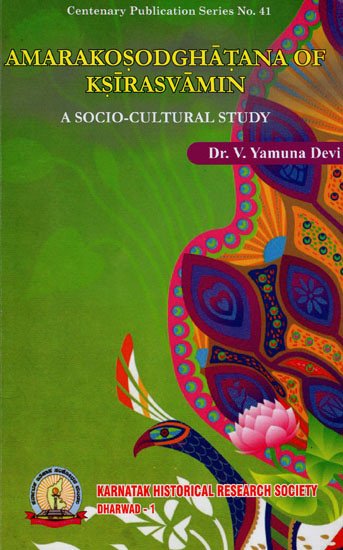Amarakoshodghatana of Kshirasvamin (study)
by A. Yamuna Devi | 2012 | 77,297 words | ISBN-13: 9788193658048
This page relates ‘Economics (1): Trade and commerce’ of the study on the Amarakoshodghatana of Kshirasvamin (in English) which represents a commentary on the Amarakosha of Amarasimha. These ancient texts belong the Kosha or “lexicography” category of Sanskrit literature which deals with the analysis and meaning of technical words from a variety of subjects, such as cosmology, anatomy, medicine, hygiene. The Amarakosa itself is one of the earliest of such text, dating from the 6th century A.D., while the Amarakoshodghatana is the earliest known commentary on that work.
Economics (1): Trade and commerce
The economic conditions are well represented by the measures, weights and coinage of the particular period. The explanations of Kṣīrasvāmin on ratio of various measures mark important evidences in understanding the economic conditions of his time.
All the major economic activities invariably involved the vaiśyas. Thus it justifies Amarasiṃha’s mention of all economic terms and activities listed under the Vaiśya varga. The various terminologies explained by Kṣīrasvāmin reveal the economic conditions during his period. The trader and their kinds, early banking system as followed by users, the debts and deposits are some of the terms that carry special explanations of Kṣīrasvāmin The measures and coinage are very satisfactorily commented upon by Kṣīrasvāmin throwing much light on values of measures and currency. Trade is denoted by terms mṛtāmṛta, anṛta and vaṇigbhāva.
(a) Āpamityakam (II. 9. 4; p. 201)–
[Obtained by barter:]
Trading of goods or articles seems to have been carried out by way of selling and buying and also by following the barter system.
Kṣīrasvāmin explains āpamityakam as goods obtained by barter or exchange of goods (bhāṇḍaparivartana)—
vinimayād bhāṇḍaparivartanādāgatamāpamityakam |
Kṣīrasvāmin also cites the view of Muni according to whom uddhāra is another term—
munistu—niyamaḥ syāduddhāro'pyāpamityakaḥ |
(b) Traders (II. 9. 78; p. 217):
The etymology of Kṣīrasvāmin on the various words for a trader represents the different trading methods, like stocking the goods, transporting, selling and so on.
(i) Vaidehaka is one who stocks the goods–
videhe upacaye bhavo vaidehakaḥ |
(ii) Sārthavāha is one who trades goods from place to place or conductor of a caravan–sārthāṃsādhanāṃsarato vā pānthānvahati sārthavāhaḥ |
(iii) Vikretā or vikrayika is one who sells his goods for a price–
vikrīṇīte bhāṇḍena mūlyaṃ gṛhṇāti vikretā |
(iv) Likewise krāyika or krayika is one who buys goods for a price, probably a retailer–
krīṇīti mūlyena bhāṇḍaṃ krāyakaḥ |
naigama–one in the shop,probably a vendor–
āpaṇe bhavo naigamaḥ |
krayavikrayika is probably a whole sale merchant–
krayavikrayābhyāṃ jīvati krayavikrayikaḥ |
The other terms to denote a trader mentioned in Amarakośa are vāṇija, vaṇik, paṇyajīva and krāyika; mūlya, vasna and avakraya is the price of commodity.
